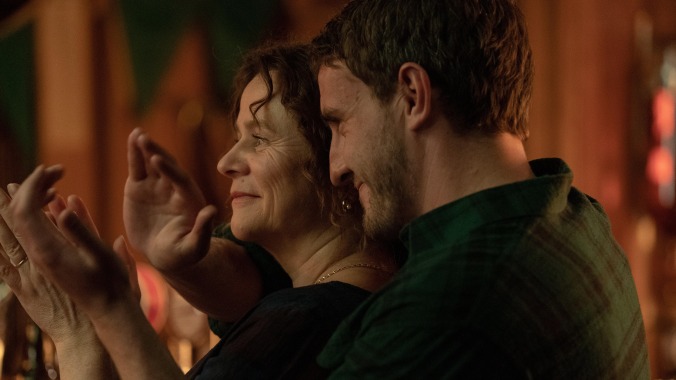Emily Watson is haunted by a lie in the bleak but powerful God's Creatures
Paul Mescal plays a prodigal son returning to his Irish fishing village in this mournful tale from directors Saela Davis and Anna Rose Holmer

In God’s Creatures, something is rotten in a seaside Irish village. It’s not just the literal mold found in a batch of shellfish, bad enough to shut down the local fishery and jeopardize everyone’s hard-earned livelihood. Is it the repressed trauma of secrets long held and never reckoned with, from one generation to the next? Is it the frigid Atlantic reaching out to curse them for, as one character calls it, “raping oceans”? In the opening sequence of directors Saela Davis and Anna Rose Holmer’s follow-up to 2015’s The Fits, a man’s body is pulled from the water: a tragic but routine exercise for this tight-knit community that superstitiously teaches their own to fear the ocean rather than learn to swim. (If you see someone drowning, the thinking goes, you’ll imperil yourself jumping in to save them. Better for every man to live for himself.)
There are no easy answers in this poetic meditation on the symbiosis between mothers and children, and man and nature, adapted by Shane Crowley and based on a story he wrote with Fodhla Cronin O’Reilly (who also produced the similarly gray-seaside-set Ammonite). But what’s plaguing this wind-battered coast could be its catalyst: Brian O’Hara (Paul Mescal), appearing unannounced in his hometown after years abroad. At first, his cheeky charms are a long-awaited comfort for devoted mother Aileen (Emily Watson), who stares awestruck at Brian as though her life has been made whole again. But Brian’s withdrawn father (Declan Connolly) and wry sister (Toni O’Rourke) aren’t as unquestionably welcoming. And it’s not long until his presence curdles into unspoken horror when neighbor Sarah Murphy (Aisling Franciosi) levels an accusation, the consequences of which ripple outward, threatening to engulf everyone in this small town. Aileen, called upon to testify that her son could have committed no such act, barely hesitates to provide his alibi.
Barely. Watson, master of the closeup that she is, uses that knee-jerk decision as the dawning of this character’s disillusionment. Given to staring over the brim of teacups, cigarette fizzling in hand, Aileen begins thinking the unthinkable, believing the unbelievable. Davis and Holmer wisely keep their camera trained on the actor’s bewildered face, their slow zooms feeling like walls closing in on her and us. Aileen is one of the film’s only figures seen head-on; although we’re treated to Brian’s easy smiles, he’s often in profile and off-center, like we can’t quite get a read on him. As word of the allegation spreads, Sarah stops showing up to work shifts at the fishery, and Brian continues reviving his family’s oyster beds like nothing has changed, the astonishing Watson hints at the turmoil shaking Aileen’s very foundations as a mother and woman.
She’s accompanied by a wonder of a score from Danny Bensi and Saunder Jurriaans. The clack of oyster shells on a factory belt blends with “thunk!”-ing staccato percussion. Strings wail like keening voices. Booming drums intrude even upon seemingly placid moments, ratcheting up the tension and evoking the storm brewing outside Aileen’s window and in her soul. It’s a lot. For better or worse, the music becomes the real star of God’s Creatures; Bensi and Jurriaans do so much of the heavy lifting, in fact, that there are times the film threatens to become more atmosphere than substance. A24’s domain is vast and varied enough to resist a single through-line, but the producer-distributor has a tendency to let tone drive drama rather than the other way around. That’s certainly the case here, where more faith could have been placed on the strong cast and Crowley’s revealing dialogue, and cinematographer Chayse Irvin’s gloomy vistas to establish the ominous vibe.
The Atlantic is certainly threatening enough on its own. God’s Creatures is probably cinema’s most frightening depiction ever of the perils of oyster farming. Davis and Holmer do a brilliant job training us to dread the rising tides as the foolhardy men who risk wading through them do. But the filmmakers’ focus remains on how “we’re all God’s creatures in the dark,” as the lyrical Sarah intones. Mother nature is uncaring rather than vengeful or generous, it seems; our fates are in our own hands. So Aileen tiptoes around asking Brian outright about the night in question, spiraling from certainty to doubt, remorse to resentment, until she’s ready to release a verdict of her own.
Two powerful moments punctuate this film’s conclusion: one abrupt and unambiguous, one mournful and contemplative. Crowley’s story ultimately shifts to a perspective Hollywood stories don’t often empathize with, hinting at a breaking of cycles, a kind of triumph in the face of both man and nature’s adversity. Mescal is well cast—after all, how could someone with such an angelic face do something so vile?—but he’s ultimately treated as an afterthought, not deserving of the level of nuance we see in Aileen and, it turns out, Sarah. As the latter, Franciosi combines working-class physicality with a convincing sense of poetry that enables us to glean our own interpretations from a Gothic-Irish tale that, while assuredly tragic, ends up not entirely a tragedy.